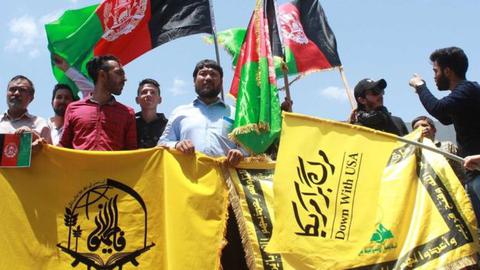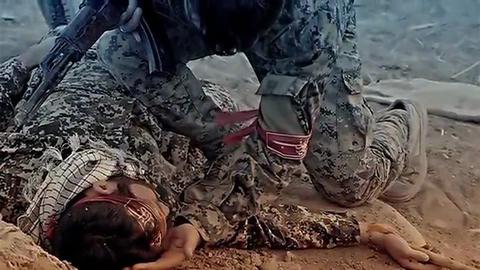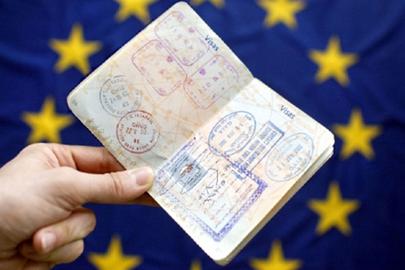A citizen journalist using the pseudonym Reza Bagherzadeh talked to an Afghan man who was recruited to fight in the Fatemiyoun Brigade in Syria, a unit established by Iran’s Islamic Revolutionary Guards Corps (IRGC) specifically for Afghan Shias. The former soldier agreed to talk to the journalist on condition of anonymity.
He says it is a miracle that he’s alive today after living through the bombs and rockets that killed some of his comrades. Looking back on those days, he considers going to Syria to be the biggest mistake of his life.
He joined the Fatemiyoun at the age of 15. He fought for one tour before he was injured in an ISIS ambush and then transferred to Tehran for medical attention. Today he works in a motel in Kabul, but he lives in fear that the Afghan government will identify and prosecute him. Although he agreed to the interview, it was not easy for him to talk about those lost days and he was scared for his life.
The first thing that caught my eye was his small stature — it was hard to picture him in combat uniform fighting as a Fatemiyoun soldier. And yet, just four years ago, he fought in the dangerous combat zones of Syria.
He started his story from the time he was working in construction in Tehran. One night two of his friends and former co-workers paid him a visit. After some introductory chat, his friends told him he would get nowhere doing construction work. “They told me as long as I made that little every day, I wouldn't be able to make a life for myself. Also, there were times we could not even find low-paying jobs and had to go to sleep hungry.”
He told his friends that he did not know any other job and construction work was the only thing he could do. They suggested that he join the Fatemiyoun brigade to defend the holy shrine of Zeinab, the sister of the second and third Shia Imams. He would be fulfilling his religious responsibility and also get paid for it. His friends, who had already done one tour in Syria with Fatemiyoun, described their time with the brigade and convinced him to join. They told him he needed to talk with IRGC officers in order to get recruited. “They told me I’ll get paid three million tomans (US$230) per month and will also get a permanent resident card for Iran. They said I wouldn’t have to be worried about immigration agents anymore and wouldn’t need to hide. They told me that we wouldn’t be sent to combat zones and that we would be near the shrine, protecting it from the infidels.”
Registration and Deployment
As someone who was exhausted from construction work, this was an easy decision to make. He met the same friends three days later in the north of the city near one of the Fatemiyoun recruitment offices. “An Iranian guy handed me a form and asked me where my family lives and who my parents are. I told them they were in Afghanistan. He said, ‘okay, just give us the details of a friend or relative in Iran and bring along the filled-out form with some 3x4 photos.’”
At the time of registration, he didn’t ask any questions about the process — he thought his friends had told him everything. The registration officer did not ask many questions either. He only asked about his workplace, his parents’ names and social status.
He filled out the form and took it back to the office. His cousin was introduced as his representative, the person responsible for informing his family if he got injured or killed.
The soldier-to-be received a phone call two weeks later from someone at the Quds Corps of the IRGC, and was sent to Yazd for a training course. During the course, IRGC officers taught him about guerrilla tactics, how to use firearms, hand-held bombs and grenades, and other military operations. “They trained us for 21 days,” he told me. “There were 80 of us, mostly Afghans. There were other kids my age too. There were a few Pakistani Shias among us as well, who joined Zeynabiun corps when we got to Syria. The officers taught us what to do during an attack or when under ambush, and how to use guns to survive.”
After the training, he and others were flown to Syria and had one more week of training there. The IRGC and Fatemiyoun commanders showed them the battle zones and strategic areas so they wouldn’t be surprised once it came time for them to go out on missions and operations. Since he had thought he would be defending the shrine and not going out to battle, he soon felt moved to complain to the commanders. Why, he asked them, are he and his friends being sent to the frontline to fight against ISIS rather than stay in Damascus to protect the shrine?
"I Can't Go Back"
He sat with me and talked about those horrifying days he experienced as an underage soldier. He said in Syria, Afghans kill each other for other nations’ interests. ISIS also uses Afghan Sunni fighters in Syria, which he saw for himself one day. “One time when we were sent on a mission, four of [our unit] were killed, but we won the fight against the ISIS fighters. Some of the ISIS injured fighters were on the ground and when we went to kill one of them, he said to me in Persian, ‘I’m Afghan, don’t kill me.’ It was then when I found out Afghans also fight for ISIS. The only difference was that they were Sunnis.”
Like him, he said, many Afghans joined Fatemiyoun because they could not find any other work and the IRGC paid well, or else they risked their lives to get Iranian citizenship and provide a better life for their families. He emphasized that although he saw these people in combat zones, later none of them were able to get Iranian citizenship.“The majority of the people I encountered were there because of financial difficulties. Some of them would say honestly that they are there for the high pay and Iranian citizenship. However, even people who were there for their seventh or eighth term did not get Iranian citizenship.”
He talked about his first days in Syria and how he fought, as a kid, for the IRGC for 40 days. “When we were ambushed by ISIS, they were surrounding us from all four directions. Eighteen of us were killed there, and all were Afghans. I also got injured in my hand and leg along with six other fighters.”
At that point, he began to cry uncontrollably. Then he said: “My comrades were all kids and teenagers, who died right in front of my eyes. I was lucky to return back alive.”
After he was injured, the IRGC transferred him back to Tehran for medical treatment at a hospital specifically for Fatemiyoun fighters. In the hospital, he came across fellow Afghans who had lost their hands or feet, many of them boys under 18 years old. He was there for about 20 days.
When his injuries began to heal a little, an IRGC officer told him that he needed to get ready to go to Syria again.
But he already made up his mind. He experienced death up close, and he knew he couldn’t do go back to Syria again, so he decided to escape. He said he had no option but to leave Iran.
First he left Tehran for Qom and from there he found his way back to Afghanistan. After going home, he began worrying about the government finding out that he had joined and fought for the Fatemiyoun. He worried about being prosecuted if he was identified.
I asked him about life in Afghanistan and the economic situation there. If he couldn’t find a job there, would he be willing to go back to Syria and fight again? He turned silent for a few moments and then replied: “No, never. I hope we reach peace and prosperity in Afghanistan. But no matter what happens, I would rather stay here and fight in my national army against terrorists. Even if I die then, I’ll be dead for my own country. It’s better than getting killed for Iran in Syria.”
Reza Bagherzadeh, citizen journalist, Mazar Sharif
Read more from IranWire's series about the Fatemiyoun Brigade:
“Afghan Fighters Knew the Risks Involved in Syria”
The Secret Training Camp for Iran’s Afghan Soldiers
Iran’s Teenage Afghan Fighters
visit the accountability section
In this section of Iran Wire, you can contact the officials and launch your campaign for various problems


























comments